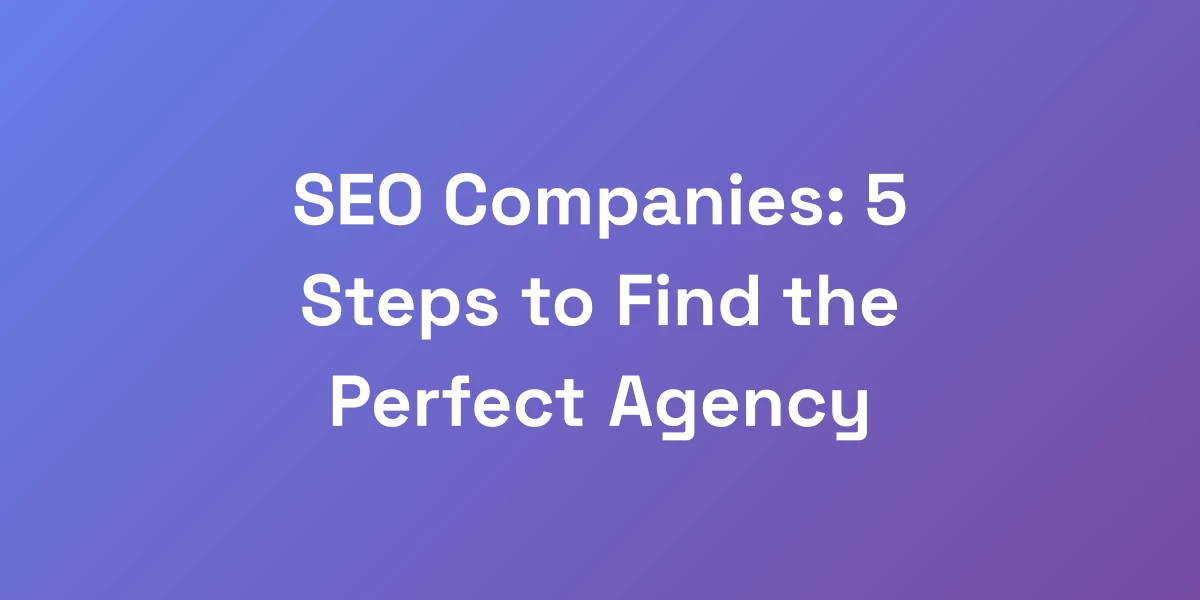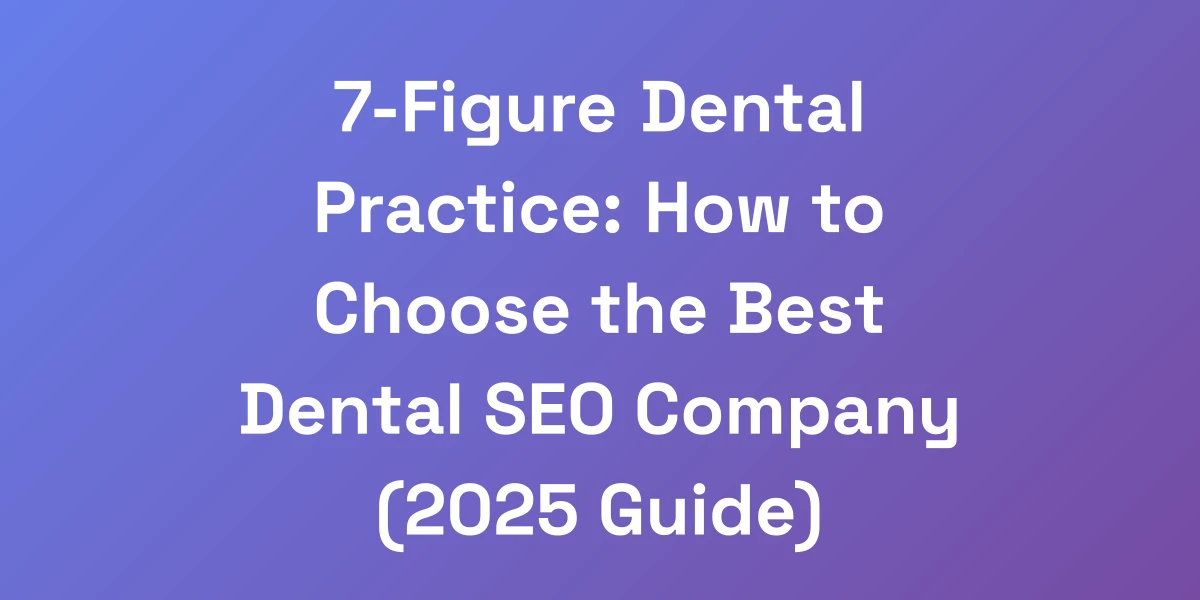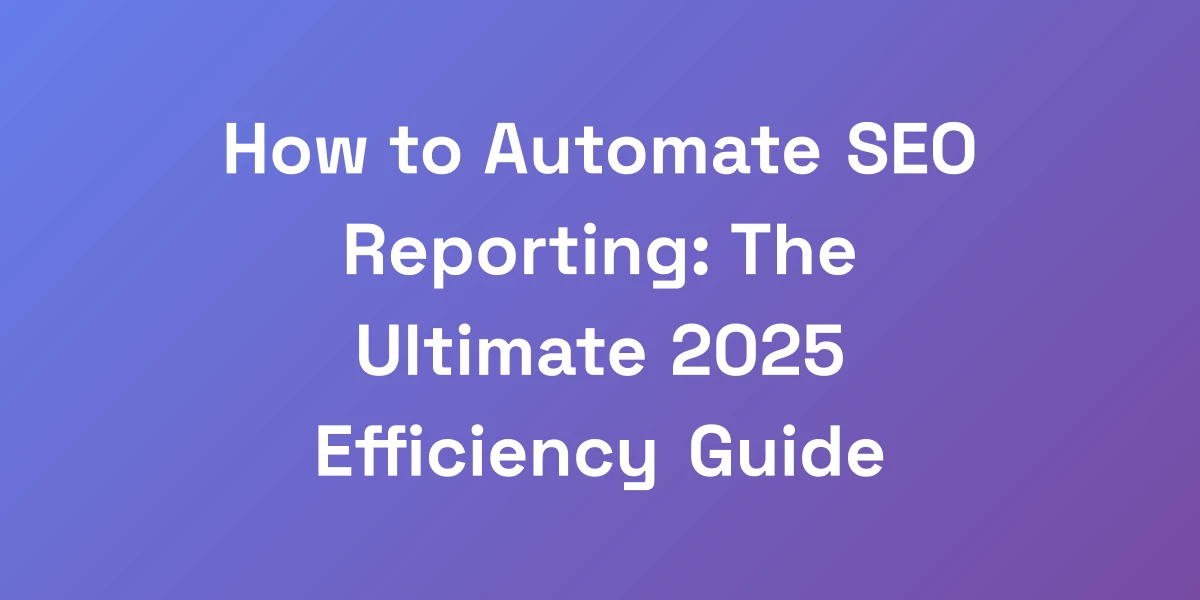
How to Find the Perfect SEO Company Near Me: A Bulletproof Guide
Feb 27, 2025 | By zishansami102@gmail.com
The Hidden Truth About Local SEO Companies Most Business Owners Miss
Let us lay it out straight: 90% of local SEO companies are selling you outdated strategies that don’t work anymore. We’ve been in the trenches, blowing millions testing what truly moves the needle in SEO. Proximity? It’s not the golden ticket you think it is. You need a partner who gets the modern search landscape. In this guide, we’re diving deep into how to sift through the noise and identify the real players from the pretenders. We’re using the same framework we rely on to vet best SEO outsourcing companies for our own eight-figure businesses. Ready to separate fact from fiction? Let’s get into it.
Why Location Shouldn’t Be Your Primary Selection Factor
Thinking that the closest SEO company is the best? Think again.
Location might give you the convenience of face-to-face meetings, but it doesn’t guarantee expertise. The SEO world is global; what matters is their understanding of your local market and the top ranking factors for local SEO in 2025.
- Global Expertise Localized: A company with remote resources can offer diverse insights tailored to your area.
- Access to Advanced Tools: Proximity is no match for automatic SEO optimization tools that companies worldwide can provide.
- Flexible Communication: Time zones matter less when you prioritize effective communication channels.
Imagine relying solely on proximity and missing out on innovative tactics that drive real results.
The Real Cost of Choosing the Wrong SEO Partner
Choosing the wrong SEO partner can bleed your budget dry without delivering the returns you expect.
Here’s what happens when you go with the wrong company:
- Wasted Resources: Money spent on ineffective strategies could have been invested in proven techniques.
- Missed Opportunities: Poor SEO practices lead to lower rankings and less visibility.
- Damage to Reputation: Black-hat SEO tactics can get your site penalized by Google, harming your brand.
We’ve seen businesses throw thousands into SEO campaigns only to see negligible growth. It’s not just about the immediate costs but the long-term damage that can set you back significantly.
Key Performance Indicators That Actually Matter
Not all KPIs are created equal. Focus on the ones that drive real growth.
- Organic Traffic: This indicates how well your site attracts visitors through search engines.
- Conversion Rate: Are visitors taking the desired actions, like making a purchase or filling out a form?
- Keyword Rankings: Track the performance of targeted keywords to gauge SEO effectiveness.
- Backlink Quality: High-quality backlinks boost your site’s authority and rankings.
- Bounce Rate: Lower bounce rates suggest that visitors are finding what they need on your site.
Focusing on these KPIs ensures that your SEO efforts align with business goals and deliver measurable results based on SEO benchmarks by industry.
Red Flags That Scream “Stay Away”
Spotting a bad SEO company early can save you a lot of headaches.
- Guaranteed Rankings: No one can guarantee top rankings due to ever-changing algorithms.
- Black-Hat Techniques: Practices like keyword stuffing or buying links can harm your site in the long run.
- Lack of Transparency: If they’re not clear about their SEO services or reporting, it’s a major red flag.
- No Customized Plans: One-size-fits-all solutions rarely address your specific business needs.
- Poor Communication: If they’re hard to reach or don’t provide regular updates, you’re setting yourself up for frustration.
Trust your instincts. If something feels off, it probably is.
The Truth About SEO Pricing Models
SEO pricing is a minefield. Let’s cut through the noise.
Here’s the lowdown:
- Monthly Retainers: These provide ongoing SEO services and are great for long-term strategies.
- Project-Based Pricing: Ideal for specific, short-term projects with clear deliverables.
- Hourly Consulting: Pay for the time you need, which can be cost-effective for smaller, less complex needs.
- Performance-Based: Pay based on the results achieved, aligning the company’s incentives with yours.
Understanding these models helps you choose the one that aligns with your goals and budget, ensuring you get the most bang for your buck.
Essential Questions That Expose Amateur SEO Companies Instantly
Here’s what separates the pros from the posers: their answers to these critical questions. Most business owners ask surface-level questions that any agency can BS their way through. Instead, we’re giving you the exact questions that make mediocre agencies squirm. These are the same questions we used to filter out 99% of agencies before building our $100M+ portfolio of companies. Get ready to take notes – this will save you thousands in wasted marketing spend.
Technical SEO Assessment Questions
Technical SEO is the backbone of your website’s performance. Ask these questions to ensure they’re up to the task:
- What is your approach to site architecture and internal linking? A solid strategy here ensures search engines can efficiently crawl your site.
- How do you handle mobile optimization? With mobile-first indexing, this is non-negotiable.
- Can you perform a comprehensive site audit and provide actionable insights? Regular audits identify and fix issues that could hinder performance.
- What is your process for improving site speed and performance? Faster sites not only rank better but also enhance user experience.
If they can’t provide detailed answers, they might not have the technical prowess needed to elevate your SEO game.
Content Strategy Validation
Content is king, but only if done right. Validate their content strategy with these questions:
- How do you conduct keyword research and integrate it into the content strategy? Effective keyword integration drives relevant traffic.
- What is your process for creating high-quality, engaging content? Content should not only attract but also retain visitors.
- How do you ensure content is optimized for both users and search engines? Balance is key to maintaining readability while climbing rankings.
- Can you provide examples of content that have significantly improved rankings? Real examples showcase their capability and success.
A robust content strategy is essential for sustainable SEO success, so don’t settle for vague answers.
Link Building Methodology Check
Not all backlinks are created equal. Here’s how to probe their link-building tactics:
- What is your approach to acquiring high-quality backlinks? Quality over quantity ensures long-term SEO benefits.
- Do you use guest blogging, outreach, or other strategies? Diverse strategies indicate versatility and depth.
- How do you ensure that backlinks are from reputable sources? Reputable sources enhance your site’s authority and trustworthiness.
- What measures do you take to avoid penalties from bad backlinks? Preventative measures safeguard your site’s standing with search engines.
Effective link building can drastically improve your site’s authority and rankings, but it must be done correctly.
Reporting and Analytics Depth
You deserve visibility into your SEO performance. Scrutinize their reporting practices:
- What metrics do you track and report on regularly? Comprehensive metrics cover all aspects of SEO performance.
- How often will I receive automated SEO reports? Regular updates keep you informed and involved.
- Can you customize reports based on our specific goals? Tailored reports ensure relevance to your business objectives.
- What tools do you use for tracking and analytics? Reliable tools provide accurate and actionable data.
Transparent and detailed reporting is crucial for measuring success and adjusting strategies as needed.
Case Study Deep Dive Requirements
Real-world examples speak volumes. When they present case studies, dig deeper:
- Can you provide detailed case studies relevant to our industry? Industry-specific success indicates applicable strategies.
- What challenges did you face and how did you overcome them? Problem-solving skills are essential for handling unique SEO challenges.
- What measurable results did you achieve for your clients? Concrete results demonstrate effectiveness.
- Can you offer references from past clients for verification? References add credibility and trustworthiness.
Case studies should offer a clear picture of their capabilities and proven success.
The 7-Step Framework for Evaluating Local SEO Companies
Stop gambling with your company’s digital presence. This is our proven framework for evaluating SEO partners that’s generated over $120M in revenue across multiple businesses. It’s not about fancy presentations or smooth talk – it’s about concrete results and systematic execution. We’re breaking down exactly what to look for, what questions to ask, and how to verify their claims before you spend a single dollar.
Step 1: Initial Screening Process
Your first interaction sets the tone. Here’s how to screen effectively:
- Evaluate Their Website: A professional, well-optimized site reflects their capabilities.
- Check Their Online Presence: Are they ranking well for their own targeted keywords?
- Assess Communication: Are they responsive and clear in their communication?
- Look for Transparency: They should be open about their processes and pricing.
The initial screening helps weed out those who can’t walk the talk.
Step 2: Strategy Assessment
Understand their approach to your unique needs:
- Tailored Strategies: Each business is unique – your SEO plan should be too.
- Holistic Approach: Combining technical SEO, content, and link building for comprehensive results.
- Adaptability: They should be able to pivot strategies based on performance data.
- Innovative Techniques: Staying ahead with the latest SEO trends and technologies.
A solid strategy is the foundation of successful SEO efforts.
Step 3: Track Record Verification
Proven success is non-negotiable:
- Review Past Performance: Look at their history with other clients.
- Ask for Metrics: Specific data points like traffic growth, keyword rankings, and ROI.
- Evaluate Case Studies: Detailed case studies provide insight into their process and effectiveness.
- Seek Client Testimonials: Genuine reviews and testimonials add credibility.
Your chosen company should have a demonstrable track record of delivering results.
Step 4: Team Expertise Evaluation
The team’s qualifications matter:
- Qualifications and Certifications: Ensure they have the necessary expertise.
- Experience in Your Industry: Industry-specific knowledge can accelerate success.
- Continuous Learning: They should stay updated with the latest SEO trends and practices.
- Diversity of Skills: A team with diverse skills can handle all aspects of SEO effectively.
A knowledgeable and experienced team is crucial for executing effective SEO strategies.
Step 5: Communication Protocol Check
Effective communication fosters a strong partnership:
- Regular Updates: Scheduled reporting and updates to keep you informed.
- Clear Points of Contact: Dedicated account managers for seamless communication.
- Responsive Communication: Quick responses to your queries and concerns.
- Detailed Reporting: Transparent and comprehensive reports on progress and results.
Clear and consistent communication ensures that your SEO efforts stay aligned with your business goals.
Step 6: ROI Projection Analysis
Understanding the potential return on investment is key:
- Set Clear Goals: Define what success looks like for your business.
- Estimate Potential Gains: Based on their past performance and your current metrics.
- Assess Cost-Benefit: Weigh the potential ROI against the investment required.
- Monitor Progress: Regularly track performance to ensure ROI projections are being met.
ROI analysis helps ensure that your investment in SEO yields tangible benefits.
Step 7: Contract Terms Review
Read the fine print to avoid future headaches:
- Clear Deliverables: Specific tasks and goals outlined in the contract.
- Flexible Terms: Allow for adjustments as needed based on performance.
- Performance Clauses: Align their incentives with your success.
- Exit Strategy: Clear terms for terminating the contract if necessary.
A well-structured SEO contract template protects both parties and sets clear expectations for the partnership.
How to Structure Your SEO Partnership for Maximum ROI
Most businesses structure their SEO partnerships backward. They focus on monthly reports instead of revenue-generating metrics. Here’s the truth: your SEO company should be obsessed with your bottom line, not just your rankings. We’re showing you how to create a performance-based partnership that aligns their success with yours. This is the exact model we’ve used to generate consistent 5-figure monthly returns from SEO investments.
Creating Performance-Based Contracts
Performance-based contracts ensure that your SEO partner is invested in your success.
- Define Clear Metrics: Set specific, measurable goals such as traffic increases or lead generation targets.
- Incentivize Results: Include bonuses for exceeding targets to motivate higher performance.
- Implement Penalties: Set consequences for failing to meet agreed-upon benchmarks.
- Regular Reviews: Schedule periodic evaluations to assess performance and make necessary adjustments.
This structure ensures that your SEO partner is as committed to your success as you are.
Setting Realistic Timeline Expectations
SEO is a marathon, not a sprint. Setting realistic timelines prevents disappointment and builds trust.
- Understand SEO Timelines: Recognize that significant results typically take 3-6 months or more.
- Set Milestones: Break down the overall goal into smaller, achievable milestones.
- Adjust as Needed: Be flexible and ready to adjust timelines based on performance data.
- Communicate Transparently: Keep all stakeholders informed about progress and any changes to timelines.
Realistic expectations ensure that both you and your SEO partner remain aligned and motivated.
Establishing Clear Success Metrics
Success metrics should directly relate to your business objectives.
- Revenue Growth: Track how SEO efforts contribute to sales and revenue.
- Lead Generation: Measure the number and quality of leads generated through SEO.
- Customer Acquisition Cost: Assess how SEO impacts the cost of acquiring new customers.
- User Engagement: Monitor metrics like session duration and pages per session to gauge engagement.
Clear metrics provide a tangible way to measure the impact of your SEO investment.
Implementation Milestone Planning
Structured planning ensures that SEO strategies are executed effectively.
- Phase-Based Execution: Divide the SEO strategy into phases with specific goals and tasks.
- Assign Responsibilities: Clearly define who is responsible for each task within the partnership.
- Set Deadlines: Establish deadlines for each phase to maintain momentum and accountability.
- Track Progress: Use project management tools to monitor the completion of milestones.
Milestone planning keeps the SEO project on track and ensures timely delivery of results.
Risk Mitigation Strategies
SEO comes with inherent risks, but they can be managed effectively.
- Regular Audits: Conduct regular SEO audits to identify and address potential issues early.
- Stay Updated: Keep abreast of the latest SEO trends and algorithm changes to adjust strategies accordingly.
- Diversify Strategies: Implement a variety of SEO tactics to avoid over-reliance on a single approach.
- Backup Plans: Have contingency plans to address unexpected setbacks or changes in the SEO landscape.
Proactive risk management ensures that your SEO efforts remain resilient and adaptable.
The Truth About SEO Pricing and What You Should Really Pay
Let’s talk money – specifically, how much you should actually be paying for cheap SEO services. We’ve invested over $10M in digital marketing, and we’re here to show you exactly what different service levels should cost. Forget the industry “standards” – we’re giving you the real numbers that separate overpriced agencies from true value providers. This section alone will save you thousands in unnecessary spending.
Breaking Down SEO Service Tiers
Understanding the different service tiers helps you choose the right level of investment.
- Basic Tier: Ideal for small businesses, typically includes keyword research, on-page optimization, and basic reporting. Pricing usually ranges from $500-$1,000 per month.
- Standard Tier: Suitable for growing businesses, includes comprehensive SEO services such as advanced keyword strategies, content creation, link building, and detailed analytics. Pricing ranges from $1,000-$3,000 per month.
- Premium Tier: Tailored for larger enterprises, offering extensive SEO campaigns, custom strategies, dedicated account managers, and in-depth reporting. Pricing can exceed $3,000 per month.
Choose a tier that aligns with your business size, goals, and budget to maximize your ROI.
Hidden Costs to Watch For
Be wary of additional costs that can inflate your SEO budget unexpectedly.
- Setup Fees: One-time fees for initial audits and configurations.
- Content Creation: Additional charges for creating high-quality, SEO-friendly content.
- Link Building Expenses: Extra costs for acquiring high-quality backlinks.
- Tool Subscriptions: Fees for advanced SEO tools and software used in the process.
Always ask for a detailed breakdown of costs upfront to avoid surprises down the road.
Value-Based Pricing Models
Value-based pricing ensures you pay in proportion to the results you expect.
- Performance Fees: Pay based on achieving specific KPIs like traffic growth or lead generation.
- Revenue Sharing: Share a percentage of the additional revenue generated through SEO efforts.
- Package Customization: Tailor services to fit your specific needs and budget, ensuring you only pay for what you need.
This model aligns the SEO company’s incentives with your success, fostering a true partnership.
ROI Calculation Framework
Calculating ROI helps you understand the true value of your SEO investment.
- Identify Goals: Define what you want to achieve – more traffic, higher conversions, increased sales.
- Measure Current Performance: Establish baseline metrics to compare against post-SEO performance.
- Track Incremental Gains: Monitor the specific improvements directly attributable to SEO efforts.
- Compare Costs to Gains: Analyze the costs of SEO services against the revenue generated from improved performance.
Use this framework to ensure that your SEO investment is delivering the expected returns.
Budget Allocation Strategy
Allocating your SEO budget wisely maximizes your investment.
- Prioritize High-Impact Areas: Focus on strategies that offer the highest return on investment, such as content marketing and technical SEO.
- Allocate for Tools and Resources: Invest in reliable SEO tools that provide valuable insights and streamline processes.
- Set Aside for Continuous Improvement: Reserve a portion of your budget for ongoing optimization and adjustments.
- Plan for Emergencies: Have a contingency fund to address unexpected SEO challenges or opportunities.
A strategic budget allocation ensures that every dollar spent contributes to your overarching business goals.
Conclusion
Choosing the perfect SEO company near you isn’t just about finding someone who can tweak your website. It’s about partnering with a team that understands your unique challenges, aligns with your goals, and is committed to driving tangible results. We’ve broken down the hidden truths, essential questions, and strategic frameworks to help you make an informed decision. Remember, your SEO investment should be a driving force behind your business growth, not just an expense.
Ready to take your SEO game to the next level? Start by evaluating potential partners through our 7-step framework and ensure they’re truly aligned with your success metrics. Don’t settle for less – demand transparency, expertise, and a performance-based approach that guarantees your investment pays off.
Have questions or need further advice on selecting the right SEO partner? Drop a comment below or reach out to us directly. Let’s elevate your digital presence together!








